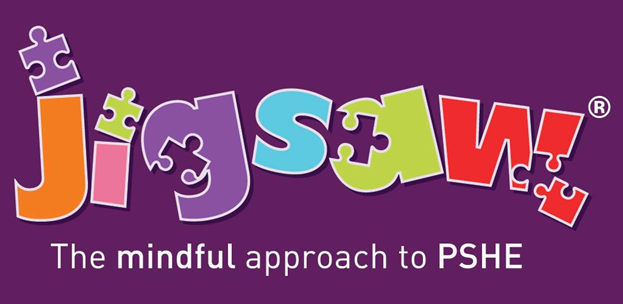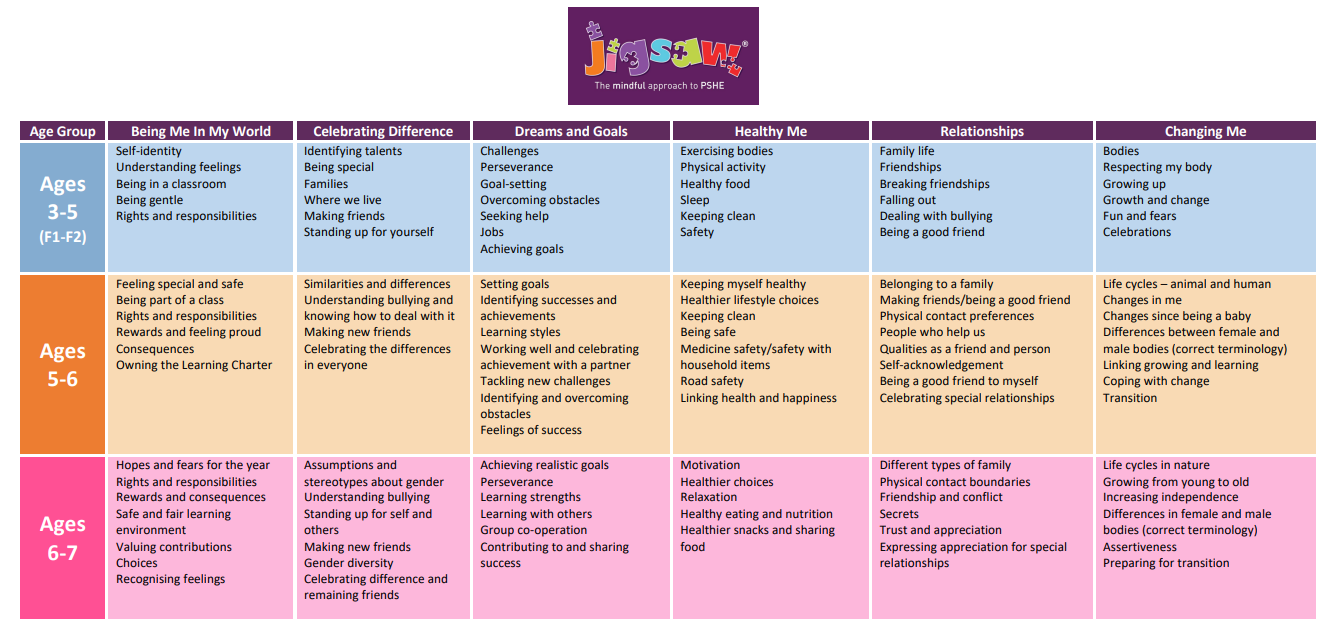PSHE (including RHE)
PSHE Curriculum Aims
At Violet Way Academy we aim to support all pupils to develop the knowledge, skills and understanding they need to help them manage life and learning effectively, now and in the future.
What is PSHE (Personal, Social, Health and Economic education)?
PSHE education is a planned programme of learning through which children and young people acquire the knowledge, understanding and skills they need to manage their lives, now and in the future. As part of a whole-school approach, PSHE education develops the qualities and attributes pupils need to thrive as individuals, family members and members of society.
What do schools have to teach in PSHE Education?
Every school needs to have a broad and balanced curriculum that promotes the spiritual, moral, cultural, mental and physical development of pupils, prepares them for the opportunities, responsibilities and experiences of later life’ and promotes British values.
What is Jigsaw PSHE?
We have chosen to use the Jigsaw PSHE scheme to deliver PSHE lessons across the school because it is a comprehensive Scheme of Work for the whole school: EYFS Reception, Year 1 and Year 2. It brings together PSHE education, emotional literacy, mindfulness, social skills, Relationships and Health Education and spiritual development in a comprehensive scheme of learning. Jigsaw’s philosophy of inclusion and valuing all children links perfectly with our own values and approaches at Violet Way Academy.

Jigsaw PSHE is designed as a whole school approach, with all year groups working on the same theme ('Puzzle') at the same time. This enables each 'Puzzle' (unit) to start with an introductory assembly, generating a whole school focus for adults and children alike. All the 'Pieces' (lessons) of learning are brought together to form a cohesive picture, helping children to know and value who they are and understand how they relate to other people in the world. Throughout the scheme, children are encouraged to reflect their learning in PSHE in their own behaviour and attitudes.
Promoting British Values and SMSC
Jigsaw contributes to the British Values agenda significantly, both through the direct teaching of information and through the experiential learning children enjoy. The 5 strands of the British Values agenda have been mapped across every 'Puzzle' (unit) and every 'Puzzle Piece' (lesson). SMSC (Spiritual, Moral, Social and Cultural) development opportunities are mapped throughout the scheme.
We make links in our whole school assemblies to the Jigsaw themes being taught and applied through the PSHE curriculum. We are proud of the way we promote emotional wellbeing for all our pupils through our Jigsaw programme, our school values and throughout our curriculum.

What is Relationships and Health Education (RHE)?
There are four main aims for teaching RHE within the context of Primary School PSHE (Personal, Social, Health Education):
- To enable young people to understand and respect their bodies, and be able to cope with the changes puberty brings, without fear or confusion
- To help young people develop positive and healthy relationships appropriate to their age, development etc. (respect for self and others)
- To support young people to have positive self-esteem and body image, and to understand the influences and pressures around them
- To empower them to be safe and safeguarded
What will my child actually be taught in Relationships and Health Education?
The Jigsaw PSHE scheme also includes relationship and health education units of work aim to give children their entitlement to information about relationships, puberty and human reproduction, appropriate to their ages and stages of development. This work is treated in a matter-of-fact and sensitive manner to allay embarrassment and fear and helps children to cope with change, and to learn about families, friendships and healthy relationships.
The ‘Changing Me’ unit is taught over a period of 6 weeks in the second half of the summer term. All lessons are taught using simple, child-friendly language and pictures, which help children understand changes more effectively. The key concepts that children learn in Jigsaw are inner strength, self-esteem and resilience. These are really important as they help keep children safe, and it helps them make healthy decisions later in life. Each year group will be taught appropriate to their age and developmental stage. Please note, at no point will a child be taught something that is inappropriate. Any questions asked outside the remit of that year group’s programme, would not be answered.
Where exactly does the PSHE Jigsaw scheme teach Puberty and Human reproduction?
Jigsaw PSHE is a holistic programme that supports children’s personal development, sense of identity and self-respect throughout, with the Relationships Puzzle offering more specific aspects of statutory Relationships Education. The whole Jigsaw Programme more than fulfils all the statutory requirements. The PSHE Jigsaw ‘Changing Me’ Puzzle (unit) contains the more specific work on these aspects.
Jigsaw’s rationale for what is taught when
We believe that knowledge empowers and protects children as long as it is age-appropriate. Correct terminology for body parts is introduced to normalise biological vocabulary and to support safeguarding. These words are not used in isolation but always in conjunction, ensuring children know these are private parts of their bodies.
Year Group Coverage for the ‘Changing Me’ unit:
- EYFS Reception - Growing up: how we have changed since we were babies
- Year 1 - Boys’ and girls’ bodies; naming body parts
- Year 2 - Boys’ and girls’ bodies; body parts and respecting privacy (which parts of the body are private and why this is)
Please view the attachments below and visit the Jigsaw PSHE website for further information.

PSHE and RE Lead
